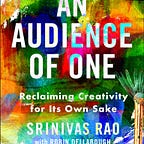What you Create for an Audience of One is Much More Likely to Reach An Audience of Millions
One of the great paradoxes of creative work is that what we create for an audience of one is much more likely to reach an audience of millions. When we sanitize and optimize our work in the hopes of driving eyeballs and clicks, the work loses its authenticity and potential resonance. So why exactly is it so compelling to create for an audience of one?
Freedom From the Need for Validation
Maybe your parents will never be impressed. Maybe your girlfriend won’t care. Maybe the investor won’t see the numbers. Maybe the audience won’t clap. But we have to be able to push through. We can’t let that be what motivates us. — Ryan Holiday
In 2013, something shifted in my writing. Up until that point, I had been writing to impress an audience. I held back, played it safe, and didn’t risk saying anything too provocative or crazy. That year, I took a different approach to my writing. Rather than write to impress an audience, I wrote to make myself happy.
What emerged was an unapologetic, no bullshit, full expression of my creativity. I self-published two books. The first one sold 1000 copies. The second became a Wall Street Journal bestseller and eventually led to a book deal and to rebranding our podcast as The Unmistakable Creative.
When we’re no longer trying to impress an audience, we’re liberated from the need for their validation.
I never choose podcast guests based on how famous someone is or how many downloads I think an episode will get. I always make my choice based on the stories I find interesting. That’s how you end up with a line up that includes bank robbers and billionaires.
When we create for an audience of one, our work is no longer dictated by the opinions of an audience. Instead, we’re driven by a love for the work itself. We create what we want to see exist in the world and make art that we’re proud to put our signature on. The work ignites our curiosity and amplifies our sense of adventure, and brings meaning to our life. It becomes a lifelong practice.
Presence
If you’re thinking about how your audience will respond to what you’ve created, by definition you’re not present.
- If Tom Brady is thinking about his post-game interview in the first quarter, his performance will suffer.
- If a surfer is wondering about impressing some girl on shore when he goes for a wave, he’ll probably eat shit (true story)
Whether you’re writing a book, recording a podcast, producing a Broadway play, or directing a movie, when you’re focused on how the world will respond, you pull yourself out of the moment, and the quality of your work suffers. When you’re not present, it’s impossible to play at the top of your game.
It Allows You to Focus on the Process
An artist has no control over how the audience responds to his or her work:
- An author can’t control what people say about his books on Amazon
- A musician can’t control what fans say about her latest album
- A Producer Can’t control how well a movie does at the box-office.
Creating for an audience of one allows us to focus on the process instead of the outcome, the craft instead of the prize. Focused on the process, we tap into an abundance of beautiful things.
We experience visible progress, which is one of our biggest motivators. We lose ourselves in the work and in the moment, experiencing deep states of flow, which are so blissful that we keep coming back to get a taste of that feeling.
No Matter How it Turns Out, At Least You’ll Have the Work
When we do something solely for an external result, whether that’s in the form of monetary compensation, traffic to a website, fame, or status, and we set ourselves up for a disappointment. But when our motivation is intrinsic, when we do the work for its own sake, no matter what happens, at least we’ll have the work.
Throughout history, iconic creatives like David Bowie, Daft Punk, and Oprah have prioritized the soul of their work over the audience’s approval of it. As Bowie said reflecting on his career:
“I didn’t strive for success. I tried to do something artistically important.”
They created for An Audience of One and reached an audience of millions. I hope my new book will inspire you to do the same. You can download a free chapter here.
